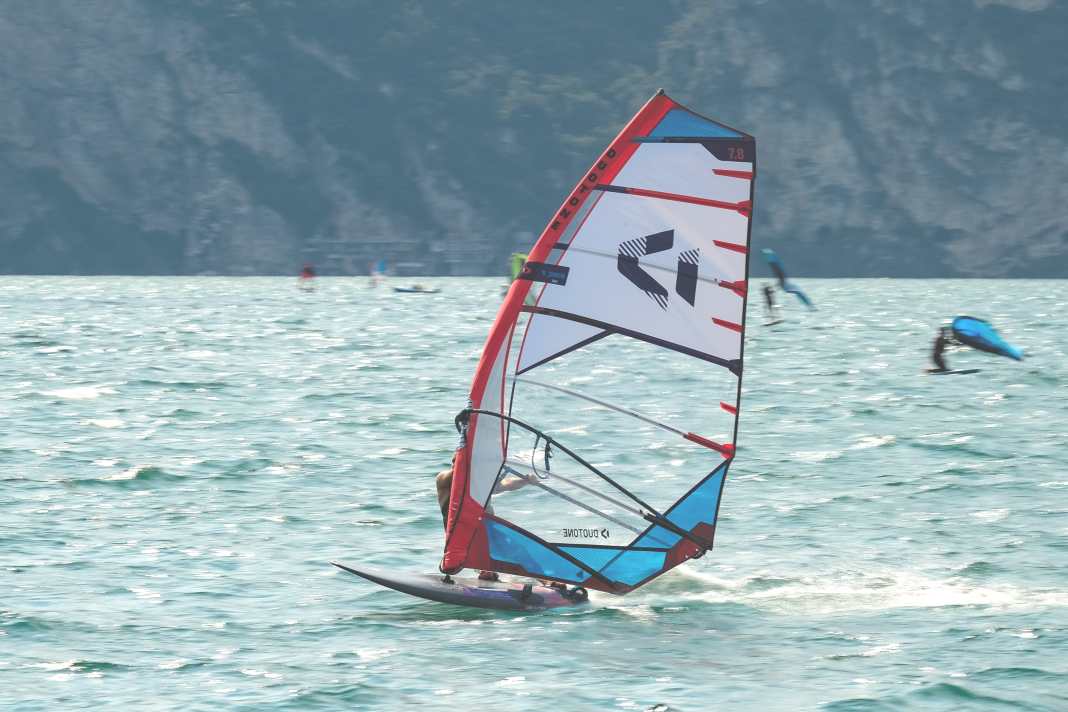





The Duotone S_Pace has a very wide mast sleeve at the bottom, which gradually narrows from the bottom with the fourth batten. The sail is equipped with three cambers that can be adjusted to the mast when tensioned using the supplied Mini-Torx. The sail has a very short cut-out with a maximum boom width of 2.18 metres. The upper eyelet is recommended for finsurfing, while the lower eyelet is suitable for foiling. The cross batten is protected, but the protruding end of the batten is not additionally secured. The sail is predominantly made of mono film, with a fairly thick X-Ply being used in the lower foot area. The upper mono film is coloured and has two trim points. Due to the low trim forces, there is a risk of over-trimming if you do not pull sensitively. Inside the mast sleeve there is a system, similar to Ezzy sails, at the bottom of the base plate to ensure correct luff detection tension - in addition to the trim aid points. The mast ends at the top in a robust plastic cap, which should also withstand rough tarmac.
On the water, the Duotone strikes very different notes depending on the trim. On the Platinum mast - which is one of the moderately stiff masts - it can be trimmed to maximum quite easily with tolerable trimming forces. It is not easy to recognise the crease and stop it in time. We were able to cover the widest wind range with a trim just below the maximum. On the other hand, the sail can also be trimmed very bulbous and for light wind performance and then offers more "punch" than all the others. However, it loses agility, lightness and control - the absolute power trim is therefore reserved for constant light winds.
A lot of power can be extracted from the S_Pace
In medium trim, however, it still offers plenty of gliding power and is powerful, similar to the NeilPryde V8and can surf right at the front with a proper emphasis on the rear hand when planing and going upwind. It resembles the NeilPryde sail to a certain extent in its sporty feel with a centre of effort further back - a characteristic from which a lot of performance can be extracted. In the planing phase, you immediately have traction to accelerate, allowing the sail to set itself apart from the field by a few metres from the starting block. As the wind increases, however, it makes sense to adjust the trim if you want to enjoy the good control at the top. With noticeable tension on the outhaul, it then remains stable until you change to the next smaller size and is tight and stable in the hand. The planing performance is also taken out of the sail to a certain extent with the clew ropes, but to a reasonable extent.
In manoeuvres, it comes close to the ease of a Moto and is in the middle of the field with the V8, as the long boom, which promotes performance in light winds, is also noticeable when shifting. In the right trim, the sail always impresses with a sporty, stable planing feel and plenty of power, which can be regulated with the back hand.
Surf summary of the Duotone S_Pace
The Duotone requires a little more effort in strong winds, but remains controllable. It shows its strengths above all from planing in light winds to the upper mid-wind range.
Overall large wind range
Slightly more sensitive to correct trim
-
Technical data Duotone S_Pace 7.8
- Sail weight: 5.65 kg*
- Mast weight: 1.76 kg*
- sleeve opening: 118-155 cm*
- Trimming force: 74 kilos*
- Mast used: Duotone Platinum 100 SDM 460; price: 999 euros
- Price: 1149 Euro
- Info under duotonesports.com
*surf measurement
